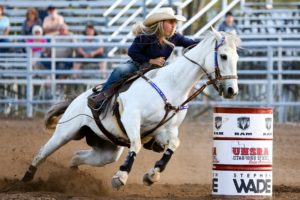
Clearly, different sports, particularly at their highest levels, require a varied set of skills and training. Western lifestyle sports like rodeo, bull riding and livestock shows continue to grow in popularity, even in non-traditional regions like New York, and while few doubt the physical strength and ability that these competitors possess, success in western sports is also a function of proper training, medical care, life counseling and financial well-being.
This is where the Western Sports Foundation, a non-profit based in Pueblo, Colo., comes in. WSF helps athletes by focusing on five key areas: mental wellness; physical wellness; life skills; financial planning; and education and career planning. Through events like this summer’s Athlete Performance Clinic in Pueblo, in which 21 athletes from around the country gathered for three days of educational sessions, workouts, discussion roundtables, interactions and use of the newest training and physical recovery facilities, WSF’s goal is to address these vital needs.
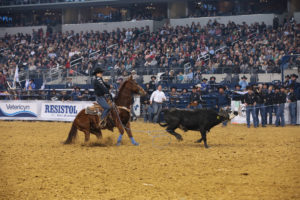
Aubrey O’Quin, Director of Programs and Operations and Mark Dobosz, Executive Director, took some time recently to talk about the organizations’s goals, some of the trends in health in the sport, and other takeaways from the summit.
SportsMD: How did the WSF form and what do you see as its critical missions?
Mark Dobosz: Western Sports Foundation acknowledges the sacrifices competitors have made to develop & expand all Western Lifestyle Sports. Athlete health and wellness has been, is, and will always be paramount. Recognizing that emotional, mental and financial health are as important as physical health, Western Sports Foundation is focused on total athlete wellness and offers services and resources that focus on total wellness.
WSF comes from a long tradition of caring for athletes and their families.
Formerly known as the Rider Relief Fund founded in 1998 following Jerome Davis’ career-ending fall and injury while bull-riding, Western Sports Foundation continues to attract and receive philanthropic support from thousands of friends, fans, sponsors, participants in and around all Western Lifestyle Sports.
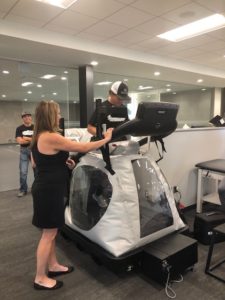 SMR: What are some of the challenges that western lifestyle sports athletes face that are the same as other professional athletes?
SMR: What are some of the challenges that western lifestyle sports athletes face that are the same as other professional athletes?
Aubrey O’Quin: The very nature of western lifestyle sports – most often seen the events of rodeo – reflect the physical, mental and emotional rigor found in other non-mainstream sports such as snowboarding, BMX motocross, boxing, skiing, luge, base jumping and dozens more.
Specifically, western sports athletes prepare for competition against another species that can be unpredictable – much like athletes who challenge the various forces of nature – be it air, water or the earth.
The challenges include being able to adequately prepare physically, but also mentally, emotionally and even spiritually. Your reliance upon your own instincts, intuition and abilities is paramount to meeting the challenge head on – whether you are riding a bull or traversing a snowy, icy mountain side on two very thin boards.
These athletes are typically “contract” employees, meaning that if they get hurt while competing, they stop earning an income. This is unlike other professional athletes, which are “employees” and continue earning some portion of their contractual income while injured. Western Sports Foundation is helping bridge that gap and hopefully helping to set these athletes up for success both while competing and beyond.
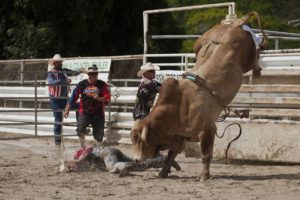
SMD: …And some that you see as unique to these sports?
AOQ: Rodeo is considered by many to be among the most dangerous sports with high vulnerability towards trauma and frequent injuries. Some studies have shown that animal/human contact events comprise nearly 80% of reported injuries.
Given that the sport is dependent on the interaction of athlete and animal athlete, western sports athletes need to prepare even more diligently in advance of competition. Organized conditioning programs, such as what the Western Sports Foundation has initiated with its Performance Training Clinics, will allow for properly planned, sport-specific conditioning that will hopefully enhance athletic potential, minimize predisposition to injury and enhance recovery.
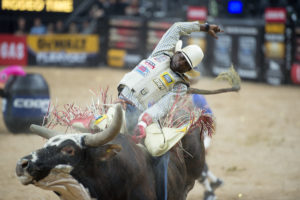
SMD: For many, western sports athletes represent strength, individualism, toughness. Are there athletes who have been reluctant to seek help and how have you overcome the perception that it may be seen as a sign of “weakness” to do so?
AOQ: As we have expanded our programs to include a focus on overall wellness – physical, mental, emotional, life skills and financial – we have shared a message that total wellness doesn’t have to wait until you have a severe injury that forces you to seek help.
We have utilized athletes who have benefited from WSF assistance and program support to help spread the word about the benefits of taking care of yourself now so that you can have a long, happy and prosperous life both during and after your career.
WSF’s full range of services of providing a comprehensive free program to assist western sports athletes in improving their overall wellness for themselves, their families and the extended families of their communities is truly a game-changer.
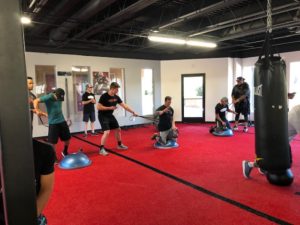
SMD: What has been the feedback from participants in the first Athlete Performance Clinic and what are some enhancements you may be making in future sessions?
MD: We have had several athletes already inquire about the 2020 series of Athlete Performance Clinics – of which there will be four.
Many remarked about how it gave them a new opportunity to work together with other western sports athletes who were also interested in becoming more knowledgeable about neurological services, brain trauma education, sports psychology, life skills and mental toughness, counseling, financial planning and sport-specific physical training.
Ezekiel Mitchell, a PBR Rookie of the Year contender who is no. 13 in the world and was one of the athletes participating in the first clinic commented, “This has been an awesome experience. Western Sports Foundation made a huge difference for me and my family when I needed assistance, and this week’s program is just another example of how much they are doing for western athletes.”
The dates for 2020 WSF Athlete Performance Clinic in Pueblo, CO will be:
February 10-12
May 18-20
July 27-29
November 16-18
Athletes can reserve a spot by emailing Aubrey O’Quin, Director of Programs and Operations at aoquin@westernsportsfoundation.org or call her at 719-242-2900
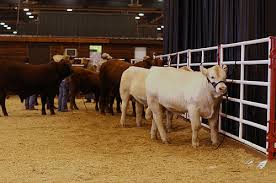 SMD: What are some facets of PBR and other western sports events that have made them popular outside of its traditional markets, and what are some ways they can expand their reach even further?
SMD: What are some facets of PBR and other western sports events that have made them popular outside of its traditional markets, and what are some ways they can expand their reach even further?
MD: Western sports are pure American mythos, offering, thrills, excitement, and an edge of the seat result unimaginable in mainstream sports – all because the competition can’t be so easily calculated. On any given night the animal athletes have a better-than-average chance to provide their human athlete competitor and experience worth the price of a ringside seat.
But beyond the competition, organizations like PBR have worked to build a community of western sports followers and fans that help to advance and extend the culture that is so important to the western sports lifestyle. The athletes – animal and human – and their families, friends, and fans make up the communities across the country where the sport has taken hold. It’s not just about the sport – and it never was – it’s about the lifestyle and the culture. Or as PBR’s new program puts it #BECOWBOY.
